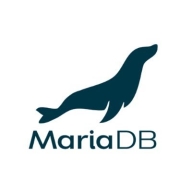

MongoDB Enterprise Advanced and MariaDB compete in the database solutions category. MongoDB appears to have the upper hand in handling semi-structured data and advanced dashboard tools.
Features: MongoDB is renowned for its flexible schema design, high scalability, and the ability to efficiently perform fast aggregations. It supports JSON-like document storage, making it user-friendly for developers and adaptable to data changes. MariaDB, conversely, is celebrated for its open-source nature and reliability, offering superb replication capabilities akin to MySQL. It is praised for its robust performance and ease of integration with other databases.
Room for Improvement: MongoDB Enterprise Advanced could improve its encryption and data security as many users find these features cost-prohibitive. Enhancing integration with popular business intelligence tools and support for advanced transactions would be beneficial. Conversely, MariaDB should focus on improving its clustering technologies and handling of complex SQL queries. Addressing synchronization issues in cluster configurations and bolstering support for write-intensive applications would enhance its competitiveness.
Ease of Deployment and Customer Service: Both MongoDB Enterprise Advanced and MariaDB offer flexible deployment options, including public, private cloud, and on-premises. MongoDB's large community and extensive resources allow users to troubleshoot independently, although enterprise support for MongoDB is highly rated. MariaDB, leveraging open-source, enjoys commendable community support but lacks the robust technical support system attributed to MongoDB's enterprise offerings. Both solutions have straightforward deployment processes, yet setting up and maintaining clusters is an area needing enhancement in MariaDB.
Pricing and ROI: MongoDB Enterprise Advanced is viewed as more expensive, especially when considering its comprehensive enterprise features, though many opt for its open-source version for cost management. MariaDB, being open-source, is cost-effective, attracting those seeking budget-friendly alternatives. MongoDB users report high ROI from performance improvements, while MariaDB's ROI derives from free use and moderate support costs compared to Oracle. Different pricing strategies exist, with MongoDB offering robust enterprise functionalities at a higher price and MariaDB providing essential features for free.


MariaDB is an open source relational database created by the original founders of MySQL. It is considered one of the most popular and trusted database servers throughout the world. MariaDB is a valued component found in most cloud offerings and is the default in many Linux tools. It is also widely used by Wikipedia, WordPress, and Google, among other well-known sites. Maria DB easily melds data into concise information from a vast array of applications, such as banking, online shopping, websites, and more.
MariaDB was originally created to improve MySQL performance. It is the most widely chosen database server due to the solution being super fast, robust, user-friendly, and easily scalable. MariaDB also offers a substantial ecosystem of plugins, storage engines, and numerous other valuable tools that make it very attractive for a significant offering of use cases.
The solution’s newest functionalities include compatibility with Oracle Database and Temporal Data Tables, and advanced clustering with Galera Cluster 4, which make it easier for users to research data history from any point in the past. Additionally, the most recent versions include JSON and GIS features. MariaDB is committed to staying an open source solution.
MariaDB Features
Reviews from Real Users
Faustine C., Engineering Supervisor- Corporate Data Solutions and Services at TZ Telecoms Corporation, shares, “The software provides a lot of information on what is happening inside the database. For most performance parameters it is easy to know if something is not right in the configuration or optimization which helps engineers take remedial fine-tuning measures. For example, if the database is underperforming it is easy to know which performance parameter can be adjusted to handle the workload. It is difficult to troubleshoot database issues if many performance parameters can not be monitored or debugged which is the case with some database management systems. It provides great monitoring of data storage, processing, and performance stability which is really important for real-time data storage and processing. It's a user-friendly product.”
A PeerSpot user who is a Senior Engineer at a tech services company relates, “ The solution's high availability is its most valuable aspect. We have found the product to be stable and the initial setup is pretty simple. I'd rate the solution at a ten out of ten. I'm very happy with it overall. I would recommend the solution to others. It's easy to find details about the product online and to learn about it.”
MongoDB Enterprise Advanced is a comprehensive platform renowned for its scalability, user-friendliness, and high performance, underpinned by its flexible document-based storage and open-source model. JSON compatibility, clustering, and security elevate its standing among professionals.
The platform facilitates efficient data management through developer-friendly tools and a strong aggregation framework. MongoDB’s no-schema requirement, supported by community expertise, underlines its adaptability. While its sharding capabilities and affordably support large data volumes, there are aspects such as security enhancement and enterprise tool integration that need attention. Indexing and query optimization pose challenges, alongside high costs. Improvements in analytics and UI could advance its infrastructure further.
What are the key features of MongoDB Enterprise Advanced?Industries leverage MongoDB Enterprise Advanced for significant roles in data storage within IoT platforms, healthcare apps, public service monitoring, and big data analytics. Companies in logistics and telecommunications find it instrumental for business process management and video content management, benefiting from its seamless integration and unstructured data support.
We monitor all Open Source Databases reviews to prevent fraudulent reviews and keep review quality high. We do not post reviews by company employees or direct competitors. We validate each review for authenticity via cross-reference with LinkedIn, and personal follow-up with the reviewer when necessary.